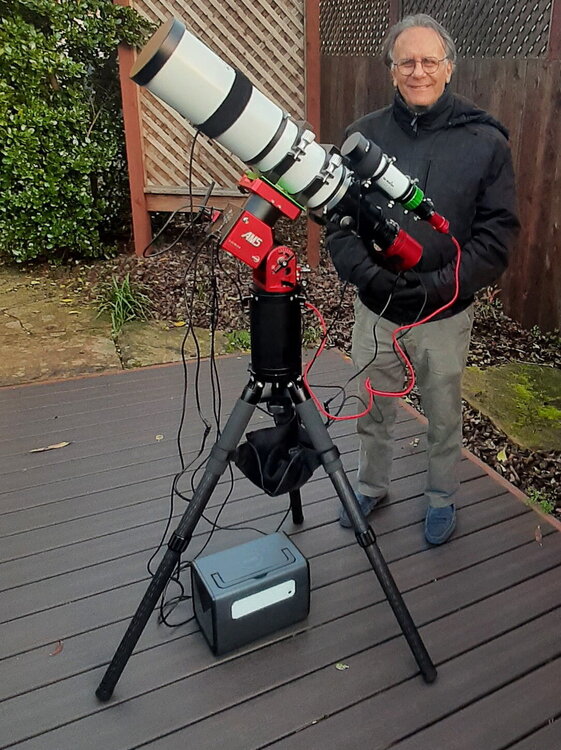-
Posts
719 -
Joined
-
Last visited
Everything posted by Jerry Gerber
-
I'm pleased you heard it that way Larry, for that was my intention. Thanks for listening. Jerry
-
You're reading too much right-wing propaganda! California is an amazingly diverse and beautiful state. The state has billions of dollars in budget surplus. It has some of the most progressive laws in the country in terms of pollution, climate change and keeping guns out of the hands of insane people. It's also got tremendous natural beauty--incomparable Redwood forests, many state and national parks, a large, diverse and well-educated population, particularly in the coastal cities, and is abundant in creative energy in the arts, sciences and technology. Does it have problems? Of course it does, like every other state in the nation there are criminals, defectives, sociopaths, ill-informed, mis-informed ignoramuses walking around. We've got our share of hate-groups, homophobics, racists and other scapegoating malcontents, but that's true throughout the country. ?
-
If you live in or near San Francisco, California, this might be of interest to you: https://www.meetup.com/meetup-group-bhzqsmbw/events/294730377
-
Hi Ross, Those are the Vienna Symphonic Library Solo Strings.. Jerry
-
Thanks EnglandBross, Wookiee, & Bjoprnpdx for listening! Jerry
-
This track is the adagio for the new quartet I'm composing.. PLAY
-
This is a work-in-progress. Produced with the Vienna Symphonic Library Solo String collection. PLAY
-
This new work is produced with the Vienna Symphonic Library solo string collection. It's a work in progress... PLAY
-

Symphony #12 for Virtual Instruments (complete)
Jerry Gerber replied to Jerry Gerber's topic in Songs
Thanks again for listening Tom! -

Symphony #12 for Virtual Instruments (complete)
Jerry Gerber replied to Jerry Gerber's topic in Songs
Thanks FreeEarCandy! -

Symphony #12 for Virtual Instruments (complete)
Jerry Gerber replied to Jerry Gerber's topic in Songs
Thanks Larry! -
I'm posting my entire 12th symphony for your enjoyment. I also want to say that I began using Cakewalk around 1990, so that's about 33 years ago. I love it now more than ever (is it weird to love a software program? (probably ☺️!). In any event, CW is an incredible work of art and science, so thank you to all the people who develop, manage, fix bugs and market this wonderful music software! This work was completed in October of 2022. I 10:03 II 5:56 III 6:25 IV 8:38 Composed for VSL Orchestral Cube and various softsynths. The 4th movement was recently accepted into the 2023 New York City Electroacoustic Music Festival (festival has time constraints so I couldn’t submit entire work). PLAY
-
Oops, you're right. I moved it over there...
-
Moved bug report to :
-
Yeah, it's no doubt miraculous that we've evolved eyes, ears and mind so that we can peer into the depths of the cosmos and try to understand what it's all about. A galaxy is essentially a configuration of hundreds of billions, or trillions of stars (suns) with each sun most likely having one or more planets in orbit around it. The closest galaxy to our own Milky Way is about 2.5 million light-years away, so if traveling at the speed of light (about 186,000 miles per second), it would take 2.5 million years to get there. That's far, but from a cosmic perspective it's not far at all. How miraculous is that! The nebula are basically star-nurseries, the hydrogen gases (emission nebula hydrogen glows red in visible light) coalesce because gravity pulls the gases together eventually getting hot enough so a nuclear fusion process begins, fusing hydrogen into helium. When this occurs, a new sun comes into being. Our own sun had a similar beginning some 6 billion years ago. Perhaps the entire reason the universe exists is for intelligent beings to evolve, learn, love and appreciate the experience. Thanks for watching and commenting!
-
Hi Bjorn, The voices were all from various sample libraries I was using in 2011, when I produced the music. I'm not sure which ones I was using back then... Glad you enjoyed it! Jerry
-
Thanks Wookiee, always happy to share!
-
And thank you for taking the time to watch!
-
Thanks Tom. I've long been interested in astronomy, got my first telescope when I was about 10 years old. Last autumn I decided I really want to study astrophotography so I took a break from music and dived into studying how to do it. I then decided what equipment was needed and started learning, setting up in my backyard in San Francisco. Each image is actually a composite of many images, sometime 20 or 30, sometimes hundreds of images, taken consecutively over 1, 2 or more nights. The camera is a dedicated astronomical camera. Each exposure is from 3-5 minutes, guided precisely by computer as the object moves across the sky. The telescope sits on a mount that is controlled by a astro-dedicated computer that wirelessly communicates with an android tablet. The images are all combined and aligned the next morning on my desktop computer and then processing and post-processing begins. It's quite an elaborate technical process just to get one image and is very enjoyable, but some luck is involved because this pursuit is wholly dependent upon the weather cooperating. I am hoping to do a lot more imaging and set them to music again. But it's been raining constantly in San Francisco since December so I'll just have to wait! Here's a photo of me in the backyard getting ready for a night of imaging. Hope all is well with you, Jerry
-
A short 6 minute video which combines my music and my astrophotography. Enjoy! PLAY
-
Thanks Grem for taking the time to listen! Jerry
-
I probably posted this sometime last year, but here it is again for those who might not have heard it: PLAY This recording was made using the Vienna Symphonic Orchestral Cube and softsynths Dune and Zebra (4 instances each). Enjoy! Jerry
-
I've had CW crash occasionally while working in the notation editor too. It happens seldom or rarely. I haven't used expression content, so though it may be crashing for you in that situation, for me it's usually when I drag and drop to either multiple staves, or some other closely-related task related to drag-and-drop. Sometimes in order to avoid that I use copy and paste, because that has never caused a crash. Jerry
-
The new virus, RSV, is certainly something to avoid. It's particularly dangerous to contract if you have to urinate. Because then you'll have to RSVP. I woke up this morning with the sudden desire to own both the North pole and Antarctica. My doctor told me I had bi-polar disease. My friend Weiner is a hot dog. He didn't like his name and decided to change it. He gathered his friends together and told them "I'll be Frank with you". Jerry




